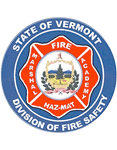The State HAZMAT Team can assist your department by delivery of many different HAZMAT classes. Below you will find a description of each class.
Air Monitoring
This class combines both classroom and hands on components of proper air monitoring. Fundamentals of air monitoring are covered including many properties of gases such as Vapor Density, LEL and toxicity. It is best to have your meter(s) present as the instructors are familiar with most meters in use.
Decontamination for EMS
Decontamination for EMS training teaches emergency medical personnel how to safely decontaminate patients exposed to hazardous materials in the field. It focuses on the use of personal protective equipment (PPE), decontamination procedures, and ensuring the safety of both patients and EMS personnel during hazmat incidents.
HAZMAT Operation Refresher
You have taken the time to get your department trained in HAZMAT and you dont want to see that time and effort lost because you did not do the annual refresher. VHMRT can help you by offering a refresher for whatever level of HAZMAT you need: awareness, operations or decon.
Decontamination for 1st Recivers - Hospital-Based DECON
Decontamination for First Receivers - Hospital-Based DECON training prepares hospital staff to safely decontaminate patients exposed to hazardous substances before entering the facility. It focuses on personal protective equipment (PPE), decon procedures, and managing contaminated patients to protect healthcare workers and prevent the spread of hazardous materials.
Lithium Ion Battery - Fire Service Awareness
Lithium-ion battery Fire Service Awareness training educates firefighters on the risks, fire behavior, and suppression tactics associated with lithium-ion battery incidents. It covers battery hazards, thermal runaway risks, and proper safety measures to prevent and respond to fires.
911 Call takers and Dispatcher hazmat Training
911 Call Takers and Dispatcher Hazmat Training equips emergency dispatch personnel with the skills to recognize hazardous materials incidents, gather critical information, and relay it accurately to first responders. The training emphasizes hazard identification, proper questioning techniques, and coordination to ensure a swift and safe emergency response.
Clan Lab Awareness Training
Clan Lab Awareness Training teaches responders to recognize and safely handle clandestine drug labs by identifying hazards, using protective measures, and following safety protocols. It focuses on chemical dangers, response procedures, and coordination with law enforcement.
Basic Propane Emergency Response
This class provides first responders with the foundational knowledge and skills to safely manage propane-related emergencies. Participants will learn about propane’s properties, common hazards, and effective response strategies for leaks, fires, and transportation incidents. Hands-on scenarios will reinforce safety practices and mitigation techniques to protect lives and property.
Chemical Suicided Awareness
This course equips first responders with the knowledge to identify and safely respond to chemical suicide incidents. Participants will learn to recognize warning signs, understand the hazards of toxic gas production, and implement safety measures to protect themselves and the public.

